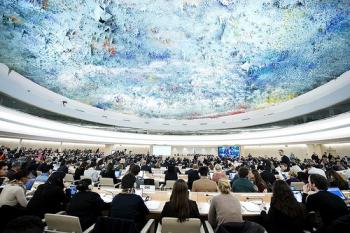June 4, 2013
Human Rights Council Must Intervene in Illicit Online Surveillance
Freedom House | 3.6.2013 | On June 3, 2013, Freedom House made an oral statement to the UN Human Rights Council raising concerns about the rise in states’ surveillance of communications. Freedom House called on the Council to discuss the protection of Internet users’ data and right to privacy during the “interactive dialogue” meeting in the Council’s Geneva Chamber, where subject experts, state representatives and observers from civil society gathered to discuss the report of the Special Rapporteur on the promotion and protection of the right to freedom of opinion and expression.
Oral Statement delivered by Freedom House, Inc.*
to the 23rd Session of the
UNITED NATIONS HUMAN RIGHTS COUNCIL
27 May 2013 – 14 June 2013
Promotion and protection of all human rights, civil, political, economic, social and cultural rights, including the right to development (Agenda Item 3)
Annual report of the Special Rapporteur on the promotion and protection of the right to freedom of opinion and expression, Mr. Frank La Rue.
Thank you, Mr. President,
Freedom House welcomes the timely and insightful report of the Special Rapporteur on the implications of States’ surveillance of communications on the exercise of the human rights to privacy and to freedom of opinion and expression. The report marks a critical juncture in our evolving communications ecosphere, in which advances in connective technologies have ushered in new magnitudes of global information sharing, while simultaneously raising the threats of unlawful government intrusion into citizens’ private lives. This blunt means of social control leads to self-censorship and directly impacts freedom of expression, and it is a growing problem across the map, including in those States rated politically free, partly free and not free in Freedom House’s annual assessments of civil and political rights worldwide. We are particularly alarmed at such disregard for individual rights to privacy in the most repressive countries, such as China, Iran and Vietnam, where government surveillance has more severe consequences, there is no the courts and the media lack independence, and where citizens are subject to harassment, prosecution, or worse if they criticize the government.
According to the report of the Special Rapporteur, increased surveillance and restrictions on anonymity undermine the benefits of communication technologies and impose a chilling effect on vital-yet-victimized voices that otherwise have much to gain from Internet and mobile communications, including minorities, activists, journalists and human rights defenders. Freedom House concurs with Mr. La Rue that without enforcement of the fundamental human right to privacy enshrined in the Universal Declaration of Human Rights, there is no way to guarantee the rights to freedom of opinion and expression. It is this Council’s essential responsibility to ensure that UN Member States uphold their obligations to protect citizens’ right to privacy, whether from extralegal domestic surveillance, extraterritorial surveillance in a foreign jurisdiction, or invasive data retention and sharing by third parties, to name just three examples. The Members of this Council should lead the way in updating and strengthening national laws and legal standards to safeguard rights to privacy and free expression online. Council Members should likewise spearhead a concerted effort to update international frameworks, beginning with a new General Comment on the right to privacy to replace General Comment No. 16, to aid in understanding and applying the above-mentioned rights in light of the evolution of the technologies and modalities of surveillance.
Communications surveillance—except when conducted in the most exceptional circumstances, as a last resort and with independent judicial supervision—threatens the foundation of a democratic society. States harm their own interests, and the interests of their people and industries, when they conduct surveillance that is unbounded by scale, duration, proportionality or independent judicial oversight. Such policies and practices also seriously erode rule of law and jeopardize a government’s own legitimacy and moral authority at home and abroad.
We call on the Members of the Council to strongly support Mr. La Rue’s recommendations and to use all available means to hold infringing governments accountable for meeting their human rights obligations.
Thank you.
* Freedom House holds Special Consultative Status with the UN Economic and Social Council.
Source: Freedom House
[subscribe2]







October 17, 2013 @ 12:13 AM
Attractive section of content. I just stumbled upon your site and in accession capital to assert that I acquire actually
enjoyed account your blog posts. Anyway I will
be subscribing to your feeds and even I achievement you access consistently fast.
October 21, 2013 @ 11:14 AM
Thanks for the marvelous posting! I actually enjoyed reading it, you could be a great author.I
will make certain to bookmark your blog and may come
back later on. I want to encourage you to ultimately continue your
great writing, have a nice afternoon!
October 21, 2013 @ 6:42 PM
For hottest news you have to go to see web and on world-wide-web I found this web page as
a finest web site for newest updates.
October 23, 2013 @ 1:08 AM
Heya! I just wanted to ask if you ever have any issues with hackers?
My last blog (wordpress) was hacked and I ended up losing many months of hard work due to no back up.
Do you have any solutions to prevent hackers?
October 25, 2013 @ 3:42 AM
Excellent blog here! Additionally your web site so much
up fast! What host are you the usage of?
Can I am getting your associate hyperlink for
your host? I wish my website loaded up as fast as yours lol